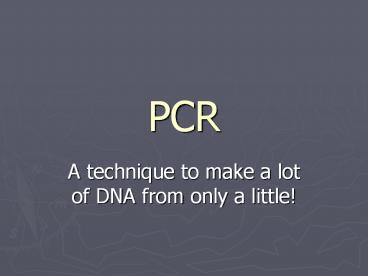PCR - PowerPoint PPT Presentation
Title: PCR
1
PCR
- A technique to make a lot of DNA from only a
little!
2
PCR
- Full name of the process is Polymerase Chain
Reaction - Invented in 1983 by Dr. Kary Mullis
- Allows scientists to make unlimited copies of
specific DNA fragments - Can amplify DNA fragments of up to approximately
10,000 bp
3
PCR
- Two problems exist for scientists to make a
visual analysis of a specific DNA locus (site or
location) - Must first isolate the specific locus from all
the other millions of sites in chromosomes - Must amplify (duplicate) the locus so that you
can see it on the gel
4
PCR Requirements
- Template DNA (what you extract)
- Primers
- DNA polymerase
- DNTP (deoxyribonucleoside triphosphates) or the
As, Ts, Cs, and Gs - Thermal Cycler
5
PCR Requirements
- Primers
- Short segments of DNA 20-30 bp long which
bracket the desired DNA segment - One primer is a complement forward primer to
produce DNA strand from left to right while one
is a reverse primer that is for right to left
strand
A T T C G C G A A A T G T T G G G C A A C A G G T
A C T C T A
G C G C T T T A C
C A G G T A C T C
T A A G C G C T T T A C A A C C C G T T G T C C
A T G A G A T
6
PCR Requirements
- If primers are carefully chosen they can select a
unique sequence in the genome
7
PCR Requirements
- Heat stable DNA polymerase
- Most commonly use Taq polymerase
- Thermus aquaticus (a bacteria found around hot
springs) - Is an enzyme that helps form new bonds between
the nucleotides in new strands of bacteria
A T T C G C G A A A T G T T G G G C A A C A G G T
A C T C T A
G C G C T T T A C
C A G G T A C T C
T A A G C G C T T T A C A A C C C G T T G T C C
A T G A G A T
8
PCR Requirements
- DNTPs
- Deoxyribonucleoside triphosphates
- Nitrogen bases adenine, thymine, cytosine, and
guanine - These DNTPs attach to the exposed complementary
bases of the original DNA
A T T C G C G A A A T G T T G G G C A A C A G G T
A C T C T A
G C G C T T T A C
A A C C C G T T G T C C A T G A G A T
C A G G T A C T C
A T T C G C G A A A T G T T G G G C A A
T A A G C G C T T T A C A A C C C G T T G T C C
A T G A G A T
9
PCR Requirements
- Ready to go PCR Beads
- For convenience, we use PCR beads which contain
freeze-dried DNTPs and Taq polymerase enzyme - All we add to them are the primer mix and
template DNA - Note
- These beads are very expensive Almost 2.00 per
bead!!! So dont mess it up!!
10
PCR The Steps of the Process
- 3 phases for each cycle (these vary slightly from
one protocol to another) - Denaturing (94-95C) DNA strands separate into
single strands - Annealing (58C) Primers anneal (attach) to the
separated DNA strands - Extending (72C) New complementary strands are
made as the Taq enzyme helps to form bonds with
the DNTPs
11
PCR The Steps of the Process
- Approximately 30 cycles of these 3 phases are
used - Each cycle produces twice as many targeted DNA
segments as existed before - After 30 cycles approximately 1 billion copies
are produced - Takes approximately 2 hours
12
(No Transcript)
13
(No Transcript)
14
PCR Equipment Thermal Cycler
2,600
15
PCR Equipment Thermal Cycler
- It is possible to substitute 3 water baths at the
3 different temperatures for a thermal cycler,
but - DNA samples would have to be moved from water
bath to water bath to water bath for 30 cycles!
16
PCR Activity Paper PCR
- Use strips of paper to create 4 cycles of a PCR
reaction. - Color code the reactions as follows
- Red Template DNA strand (40 bp)
- Write the following sequence on one red strip
- A C G A T T G G G C C A A T A T A C G C G T G A T
G T T C G A A G A G A C T
17
PCR Activity Paper PCR
- Yellow 1st copied strand
- Blue 2nd copied strands
- Green 3rd copied strands
- Forward primers are white
- Reverse primers are gray
G A T T C C A T A
18
Steps of DNA Isolation
- 10 mL of saline, swish, spit, use 1mL of this.
- Centrifuged
- Poured off saline then resuspended
- Removed 30 uL and added to 100 uL of Chelex to
absorb cell debris and ions. - Boiled for 10 minutes.
- Withdrew 30 uL stored in new tube.
19
Day 2 Amplification
- Added 22.5 uL of Primer Mix into PCR bead.
- Added 2.5 uL of DNA.
- Quick spin to put everything together.
- Thermal cycler
- DAY 3 Ran gels































